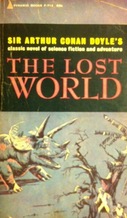
Really, it was quite a fun read. Below is a review I did at Goodreads:
https://www.goodreads.com/review/show/1042538401.
Rafeeq
Sir Arthur Conan Doyle's 1912 The Lost World is, for its period, a very nice five-star adventure story. While the very beginning, with its seemingly conventional sentimental claptrap of competing for a lady's approval, is perhaps the weakest part of the tale, we soon get down to treacherous Amazonian jungles, conniving betrayals, and prehistoric beasts galore--and the close of the novel reveals that, as conventional sentimental claptrap goes, the author actually is a jolly good sport about poking mocking holes in it.
The tale begins when the narrator, Edward Malone, an Irish rugby champion and now earnest young reporter for the Daily Gazette, desireth for the purposes of marriage the hand of Miss Gladys Hungerton. This coolly superior icon of desirable young womanhood, however, is swayed neither by words nor by flowers but by deeds. Heroism is required, she preaches from the comfort of an English drawing room. Only a hero can win her, for only then can she be "what [she] should like to be,--envied for [her] man."
This may not be the deepest or most flattering thing a girl has ever told a suitor, but 'tis enough to send the love-struck newspaperman to attempt the closest thing he can to heroism: interviewing the imposing Professor Challenger. Challenger, after all, already has violently assaulted several who doubted his stories of finding during his most recent expedition to South America a seemingly inaccessible plateau in the depths of the jungle, along with the sketchbook of a dead American artist depicting pterodactyls and other Jurassic beasties. When the bristly Challenger speaks at the Zoological Institute, he of course is denounced as a charlatan, and it is agreed that a mission shall set out to the Amazon to prove orthodoxy still correct. Professor Summerlee, Challenger's most vociferous critic, calls for volunteers to join him, and Malone literally jumps to his feet, followed by adventurer and big-game hunter Lord Roxton. Miss Hungerton's suitor will have his heroism, apparently, or die trying.
Adventure ensues. Really, the standard travelogue of the deep Amazon, replete not only with danger but also with both beauty and wonder, is a fine read, and it is spiced with the amusing conflicts of the exquisitely arrogant Challenger and the equally determined, if more restrained, Summerlee. Once the explorers surmount the seemingly unclimbable plateau--and, naturally, are trapped upon it--we will see rookeries of huge pterodactyls, great iguanodons and freshwater sea monsters, unclassifiable dinosaurs like giant toads, and even savage "missing link" ape-men. That 1300 rounds of rifle ammunition listed in the supplies definitely will come in handy, eh, what?
This book is not necessarily the place to turn for modern paleontologic or evolutionary theory, of course, nor is it for modern race relations. The trope of "faithful Negro"--who calls his British employers "Massa," no less--versus sinister and sneaky "half-breed" is painful, but it should not be a surprise, given the time of writing. In terms of outmoded ideas, however, at least when what I might call something of the intellectual narrative frame closes, the notion of jousting for a fair lady's honor takes a lovely little drubbing.
Most importantly, though, despite occasional scientific or ethnographic shortcomings inherent to its era, The Lost World simply is a fun and entertaining adventure, and even more than a hundred years later it still remains well worth reading.
1 September 2014
 RSS Feed
RSS Feed
